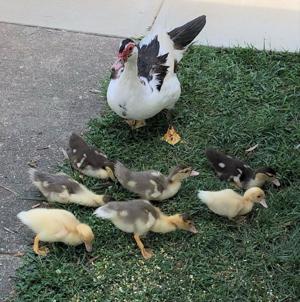‘There’s something different about these ducks’

When it comes to the ducks that have made their home in a marsh along Monroe Bay in Colonial Beach, never has it been more obvious that beauty is in the eye of the beholder.
“They’re so, so beautiful,” said Lois Thomas who contacted The Free Lance–Star, requesting coverage of what she deemed an unusual story.
“I thought, you know what, Colonial Beach is on the front page for drug busts and murders, why can’t we have something that’s good?”
When Thomas looks at the Muscovy ducks, she doesn’t see the breed known for the red, warty facial skin that can be “frankly, gross, with a knob on top of the bill and lumps all over,” according to an “Odd Ducks” article on Cornell University’s Lab of Ornithology website.
She sees something quite regal.
When the ducks are on the waddle, “they’re like, ‘Stop your car because I’m crossing the street,’” she said. “They make a spectacle of themselves with their white and black feathers and orange beaks.”
Thomas also wanted to call attention to neighbor Bill Dellar, a retired government worker, Marine and former Colonial Beach town council member whose backyard butts up against the Monroe Bay marsh. Dellar diligently feeds any feathered guests, from purple martins to swans, and he’s put up nests for ospreys, which seems to be the thing to do in Colonial Beach—if you’re not producing art for a nearby gallery.
Given his proximity to the water, Dellar might come across as the “Forrest Gump” equivalent of a box of chocolates. In other words, he never knows what he’s gonna get in terms of wildlife.
When a gray Muscovy duck appeared about three years ago, Dellar tossed some cracked corn its way as well, then he and the Thomases—Lois’ husband Bruce also served in the Marines—were thrilled to see two Muscovy couples arrive about 18 months ago.
The paired ducks must have considered the original Muscovy a fifth wheel and chased it away.
“He seemed perfectly content to be by himself and when the others showed up, he got out,” Dellar said.
Since then, one female has laid several clutches of eggs. The first batch was eaten; Dellar said there was a nest near the back door that had 12 eggs in it one night and none the next morning.
Another group of eggs produced ducklings, but the dozen babies gradually disappeared.
Maybe the third time has been the charm. The mother duck hatched a dozen fuzzballs about a month ago and so far, seven have survived snapping turtles, foxes, raccoons and whatever else may be lurking in the marshland.
The babies are an assortment of colors, from traditional duckling yellow to mottled mixes of gray and black with touches of white.
When Thomas breathlessly contacted the paper, she said how crazy it was to see wild Muscovy ducks this far north—and she’s right, that would have been really unusual. The birds are native to Central and South America, according to Cornell.
But what the Colonial Beach residents are fawning over—and what’s also shown up at local farms, ponds and even in Fredericksburg’s Central Park—are domestic ducks, not their native cousins, said Joe Ferdinandsen, a district wildlife biologist with the Virginia Department of Wildlife Resources.
Unless they’ve had their wings clipped, the domestic versions can pretty much fly wherever they want. Out of water, the ducks are good producers of meat and eggs, Ferdinandsen said, but not exactly fashion plates.
“They’re a bit of an oddity,” he said. “They’re not the prize winners in the beauty pageant of the duck world.”
However, an article on the cuteness.com website claims that whatever they lack in good looks, the Muscovies—or Muscovites if they’re Russian—make up for in temperament and usefulness. They’re friendly and affectionate, wag their tails like dogs, eat lots of pests and lay extra-large eggs.
Males tends to have the bumpiest skin, with warts that can surround the sides of their bills and go down their neck, according to cuteness.com. The warty arrangement is more delicate on the females as they have what looks “more like a masquerade ball mask, typically just around the eyes,” states the cuteness website.
While Muscovy ducks like to breed with their own kind, a single male or female will take whatever comes along, according to an article on the Backyard Poultry website. Ducklings that result from this pairing are called mules because they are sterile and cannot produce offspring.
One of the females in Dellar’s flock may fit this description. He said the males have gotten busy with her—well, that’s not exactly what he said—but no babies.
Dellar enjoys seeing the ducks in a row, coming out of the marsh, or in the back yard, waddling around and eating all the nearby bugs.
“I’m an old guy, I just enjoy watching the birds,” he said, adding that the Muscovies have been a real treat. “You can’t look at them without saying there’s something different about these ducks.”




